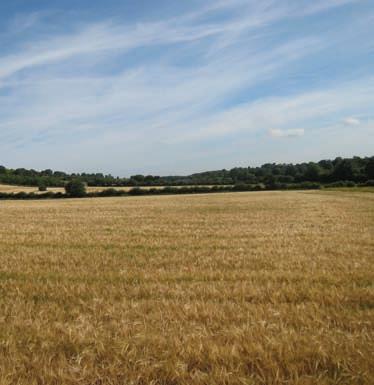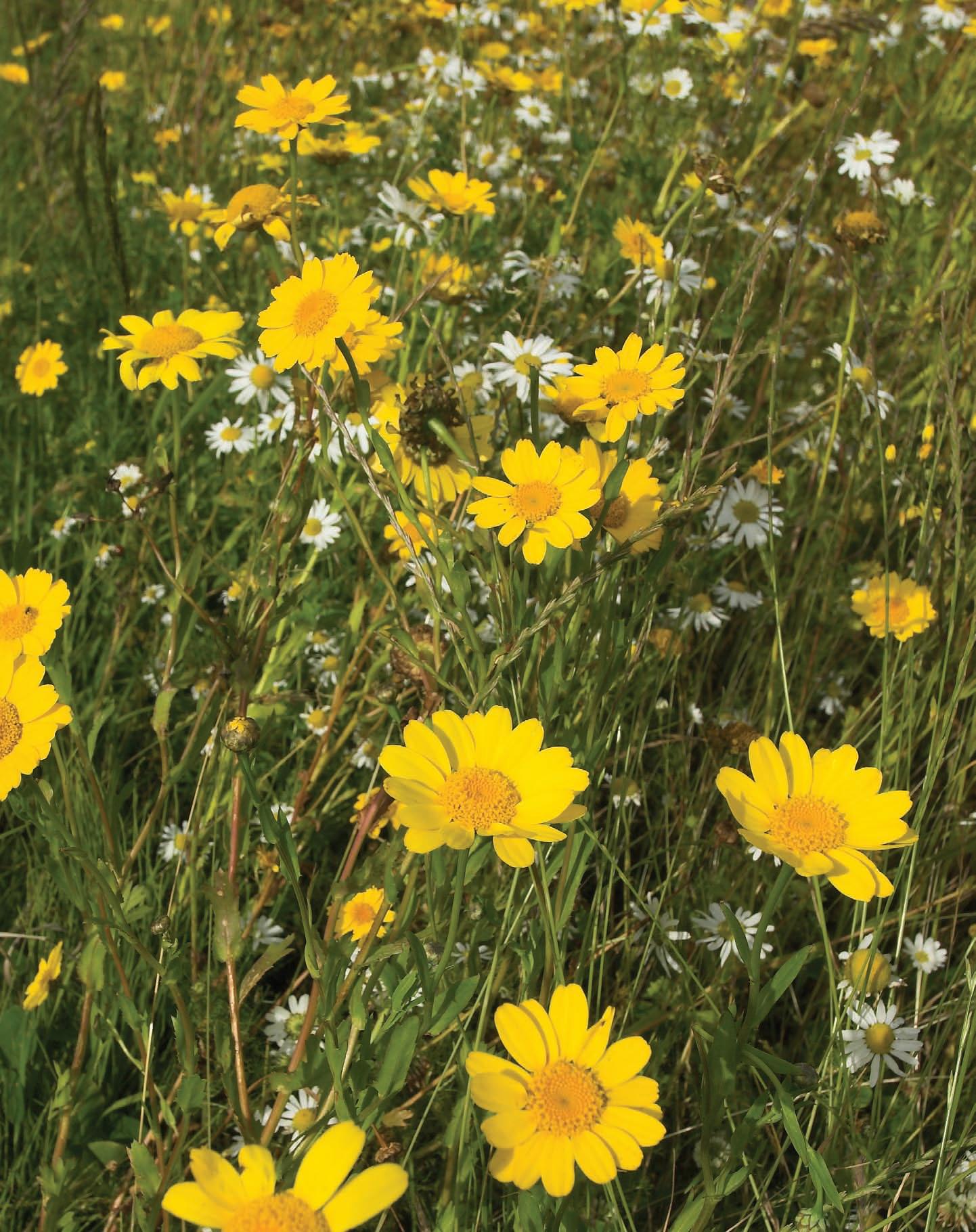
TheearthistheLord’s,andeverythinginit ICorinthians,chapter10,verse26
Toallthosewhohavefoughttosavethebestofourwildlifehabitats,without whoseeffortstheprocessofrestorationwouldhavebeenalmostimpossible
DesignDirector:AlexandraPapadakis
Designer:LeytonBrown
DesignAssistant:HayleyWilliams
Editor:SheiladeVallée
Frontcoverdesign:LeytonBrown
FirstpublishedinGreatBritainin2008by PAPADAKISPUBLISHER

AnimprintofNewArchitectureGroupLtd.
Kimber,Winterbourne Berkshire,RG208AN www.papadakis.net
ISBN:9781901092820
Copyright©CharlesFlowerand PapadakisPublisher.Allrightsreserved
CharlesFlowerherebyassertshismoralright tobeidentifiedastheauthorofthiswork.
Nopartofthispublicationmaybereproducedor transmittedinanyformorbyanymeans,electronicor mechanicalincludingphotocopying,recordingorany informationstorageorretrievalsystemwithoutthewritten permissionofthePublisher.
ACIPcatalogueofthisbookisavailablefrom theBritishLibrary.
PrintedinChina
halftitle: Bluebellsinabeechwood–thisstunning sightcanbecreatedinalifetime
frontis: Meadowcranesbillissusceptibleto. herbicidesandproducesfewseedsbutonce establisheditismagnificent
title: Ifweprovidenectar,customerswillturnup(inthis caseaMarbledWhitebutterfly)–solongaswedon't leaveittoolate
contents



massively.Today,thePearl-borderedandSmall Pearl-borderedFritillarieshavegonefrombeing ubiquitoustobeingraritiesandtheHigh BrownFritillaryisrestrictedtotheLake District.ItisonlytheSilver-washedFritillary thatremainsreasonablycommoninthelarger woods.Withoutarevivalincoppicingitishard toseethefortunesofthesebutterflies recovering.TheFritillarybutterflies’relianceon dogvioletsemphasisesjusthowlongmanhas beencoppicinginthiscountry.Someofthe ancienttrackwaysintheSomersetlevelsdate fromaround3700BC.Theyweremadefrom managedhazelcoppice!
ROADSIDEVERGES
UntilaftertheSecondWorldWara “lengthman”completewithscythewas employedtocutbackthevegetationandlook afterthevergealongeveryroadandlane.Itis hardtoimaginethescene,butthiswasbefore themotorcarhadtakenoverourlives.
Asaresult,thevergewithitswildflowerswas caredforandthecutmaterialwasremoved andstackedhereandthereastheopportunity arose.Today,manyofourvergesarepathetic
remindersofpastglories,havingsufferedthe effectsoffertiliserandherbicidesfromadjoiningfarmland,whichhasvastlyincreasedthe growthofgrassorweedssuchashogweed, withnowtheaddedindignityoftheroadside flail.Thishasbeenanotherdisaster forourwildflowers,becausethevergesin manypartsofthecountrycontainedthelast vestigesoflocalgeneticdiversity.Thereason forthisdisasteristhatalthoughtheverges maybecuttwiceayear,thecutmaterialis leftasathickmulchallovertheverge.
Theresultispredictable:thesuppressionof mostofthewildflowersandtheirdestruction overafewyears.Onlythetallandthetough cansurvivethistreatment:cowparsleyat thebeginningoftheseasonand,attheend, meadowcranesbill,whichalsohasamighty rootstockthatenablesittoforceitswayup throughthemulch.
Somecountiesarebeginningtoorganisethe managementofdiversevergesbyblowingthe cutmaterialintoahopperandremovingit. Butasthingsstandatpresent,theoutlookfor roadsidevergesonlevelgroundisbleak.


top:Coppicingisessentialifdogvioletsaretoflourish
above:Woodanemonesthriveinunmanagedwoods
opposite:Greaterstitchwortsurviveswellalongrides andthewoodlandedge



CARVERSHILLFARM
Datesindicateyearofrestoration
Itisnowjustabouttwenty-fiveyearssinceIwassittingattheback ofanauctionroominahotelinMarlborough,Wiltshirebidding forourfarm.
Iknewnothingaboutfarmingandnotagreat dealmoreaboutrestoringfarmhabitats.Iwas convincedthattherewasacontributiontobe madeintermsofhelpingotherstorestorethe countryside,especiallythoseareaswherethere wasnotrackrecordsuchasrestoringwetlands andwildflowers.In1980,everyonewas ploughingupeverybitoflandtheycouldlay theirhandsontotakeadvantageoftheskyhighcornprices.SowhywasIsoconvinced thatthependulumwasgoingtoswing?
THEDREAM

opposite:Thefarmtoday.In1980therewereno woodsorponds,andthelandsouthofthefarm buildingscomprisedtwofeaturelesscornfields of29and27h(72and67acres)
pages52-53:Undreamtofwildflowerdiversity canbeestablishedonpoorersoilssuchaschalk hereatShalbourne
Ihadbeenworkingforasmalldynamiccharity calledtheBritishTrustforConservation Volunteers,whichtrainedyoungpeopleto carryoutconservationwork,suchasrestoring siltedupponds,layinghedgesandrepairing dry-stonewalls.Inthe1960sand1970sa volunteeringspiritwasemergingwhereyoung peoplewerewillingtopayasmallsumof moneytogotoremoteandbeautifulpartsof thecountryandworkflatoutforaweekora weekendtoputrightsomeoftheneglectof recentyears,atatimewhenourfarmerscould thinkofnothingbutlargerheapsofcorn.My jobwastoextendthenumberofregional teamsandtoco-ordinatetheiractivities.I alwaystravelledbyrail.AsIlookedoutofthe trainwindow,Iwitnessedarguablyoneofthe greatestperiodsofdestructionevertobe visitedonourcountryside.Pilesofburning hedgesandsmallandlargecopseswere commonplace.Thiswasstate-sponsored destruction,allinthecauseoftheperfectly laudableaimof,astheWhitePaperdescribed it,“Producingmorefoodfromourown resources.”Likeothersubsidisedschemes,itgot completelyoutofhand.Ofcoursethe madnesswouldendoneday,becausewelove ourcountryside,butitwasextraordinary
workingforanorganisationthatinspiredyoung peopletodosomuchgoodinthecountryside atthesametimeasthefarmingindustryand theMinistryofAgricultureweresystematically destroyingit.AsIwatchedallthisfrommy warmrailwaycarriage,Idreamedonedayof gettingholdofasmallfarmandhelpingothers torestorethecountryside.Ofcourse,itwas onlyadream!
BUYINGAFARM
Withinfiveyears,afamilytrusthadbeensold andIhadreceivedjustenoughmoneytobuy asmallfarm,butasthepriceofcornsoared sodidthepriceofland,andtheamountof landIwouldbeabletobuysteadilyshrank. ThenCarversHillFarmcameonthemarket withits71hectares(175acres)andan interestingrangeofsoiltypes.Iacquireditin December1980.Itwas,ofcourse,fartoosmall tobeaviableunitonitsown.
Ashare-farmingdealwithacousininanearby villagetookcareofthefirstthreeyearsbut evenatthatearlystagemycompletelackof understandingoftherealitiesoffarmingwasrevealedbythedrainageschemeinstalledtogrow cornonpartofthefarmthatlaywetinwinter. Rememberthatmyaimwastorestoretrees andhedges.Imaginemyhorroronrealisingthat whenyouputinadrainageschemeandthere arehedgesintheway,thehedgeshavetogo.It isassimpleasthat.Aninauspiciouswaytostart restoringthecountryside!
WiththesupportofKennetDistrictCouncil, thefirsthedgewentinaswellasthefirsttrees butthelearningcurvewassteep.Thesharefarmingschememeantthattherewasnoone onthefarmexceptwhenahugetractorcame overthehillandploughedandharrowedso



Combiningasinglespeciesseedcrop
Cropgrownseed–wildflowers
Mostofthelargeseedhousesproducesinglespeciescropsthatare harvestedattheoptimumtimeandthenallbroughttogethertomake upawildflowerseedmixofanythingfromfifteentotwentyspecies.
Atypicalmeadowmixofwildflowersisgiveninthetableon page65(seedspergramareinbrackets).Thepercentagestellquite acomplicatedstory:
•Raggedrobinhas1%becauseithas5000seedspergram,andyarrow 2%has6000seedspergram.Manyspecieshavelessthan1000seeds pergram,soahigherpercentagemightberequired.
•Betonyandmeadowcranesbillhave1%fordifferentreasons.Both occursparinglyinmeadows(unless,inthecaseofbetony,itisawet meadow),butmeadowcranesbillisexpensivetoproduce,sothereis anotherfactor.
•Commonvetchcomesinat7%becausetheseedislargeat60seeds pergram,soyouneedmoreofthem.
•Lady’sbedstrawhas10%forquiteanotherreason.Itistheonly commonmeadowplantthatisrhizomatous.Itmayhaveevolvedlike thisbecauseitflowersquitelateandwouldthereforefinditdifficultto spreadbyseed.
•Selfhealhas10%becauseitisquiteashort-livedplantandoften behavesmorelikeanannual.
Seedproducershavetoensurethatthisseedremainsessentiallywild.Ifa speciesiscropgrownyearafteryear,itswildcharacteristicsbeginto diminish.ThisiswhythereisaCodeofPracticewhichstatesthatcropgrownwildflowersandgrassescanbedescribedasbeingofnativeorigin tothewildlocationforuptosixgenerationsremovedfromthewild parentfromwhichtheseedwasoriginallycollected.Oneofthe characteristicsofaplantwhichplantbreedersremoveasquicklyas possibleisslowandunevengermination.Theywillbelookingforquick andevengermination,whichinthewildcouldwellprejudiceaplant’s
opposite:Oursmall-scalewildflowerseedproduction isabitlikemedievalstripfarming

Removinggrassstemsafterbrushharvesting
survivalifadifficultseasoncamealongandalltheplantsfailed.Sothere isarealconflicthere.Althoughtherearedangersinproducingcropgrownseed,thereisnodoubtthatitisaneffectivemethodofproducing largequantitiesofseedwithalltheavailablemechanisationofprecision seeddrills,combineharvestersandseedcleaners.
Itisasoberingthoughtthatwhenwewerecollectingseed,oftenin verysmallquantities,tosetupourwildflowerseedcropsatthefarm, wewerescavengingfromhedgebanksandroadsidevergesaswellas theneighbouringdownland.Therewasverylittleotherlocalseedthat hadsurvived.
Anotheraspectofcrop-grownseedisthatwildflowers,whichmaybe commonenoughinthewild,arenotavailablefromseedmerchants.This isbecausethepracticalitiesofgrowingthecroporharvestingitare simplytoodifficultandtoocostly.Severalspeciesofthechalkcometo mindhere.Dwarfthistleiscommonenoughbutitispricklyandlow growingandthereisnowaythatyoucouldgrowitasaseedcrop. Smallscabiousripensunevenlyandtheseedsarenotviableunlessthey reallyareripe,sothisseedisexpensive.Andthenthereisharebell characteristicofolddownlandwheretheseedsizeissosmall(20,000 seedspergram)thatthewholeoperationispainstakingandexpensive.
Crop-grownseed–grasses
Thecommercialgrassseedbusinesshasbeengrowingalimitednumber ofnativegrassesaswellasallthenewcultivarsthatwereoriginallybased onthenativegrasses.Manyseedhousesusethesecommerciallygrown nativegrassesbecausetheyperformaswellasthenativegrassesthat youmightcollectfromanoldhaymeadow.Mostseedhouseshavea simplefour-speciesgrassmixforlowmaintenanceamenitysowingsand situationssuchasfieldmargins.Speciesusedfortheseinclude:
Commonbent
Whereamoreauthenticseedmixisrequired–forexampletocreatea newhaymeadow,awidermixofgrassesisrequired,suchas:
pages68-69:GrampsHillnearWantage,Oxfordshire. Brushharvestingontheseslopesneededacoolhead
abilitytosendoutrunnerssothatitcan survivefromsmallfragmentsofrhizomes.All threeofthesespeciesalsohavetheabilityto competewithstronggrassgrowth.
Birdsfoottrefoil,lady’sbedstraw,selfhealand autumnhawkbit. Thesearesummerflowering meadowspeciesandoftensurviveinlawns, demonstratingtheirabilitytobemown continuouslyandthenflowerthemomentthe mowingstops.Lady’sbedstrawusedtobeso commonthatpillowsandmattresseswere stuffedwithitinmedievaldaysbecauseofits sweetaroma.Italsospreadsrapidlyby undergroundrhizomes.Birdsfoottrefoilis importantforanotherreasoninthatitisthe foodplantoftheCommonBluebutterfly(now uncommon).Selfhealwasahugelyimportant medicinalplantandautumnhawkbitisakey nectarplantforinsects.
Lesserknapweed,ox-eyedaisyandfieldscabious. Ox-eyedaisiesarecolourfulandoftenmakea massivedisplayofcolourintheearlydaysofa newwildflowermeadow.Theythendiminish toascatteringofplants,whichiswhatyoutend tofindinthewild.Lesserknapweedisakey nectarplantforbutterflies.Itoftenstartsin relativelysmallamountsandcanthendominate ifitisnotcutearlyenough,henceitsname.Ifit isallowedtoflowerthroughuntilSeptember,it willdominatethewholearea.Thiswaswhythe haycuttingdateof25thJulywasconsidered importanttokeepthevariousspeciesin balance.Fieldscabioushashighqualitynectar forbutterfliesbuttheseedsarepopularwith finchesandonlyseemtogerminatewellon thinchalkysoils.
Ribwortplantainandyellowrattle. Ribwort plantainwasalsocalledribgrassbecauseyellow rattleusedtowipeoutallthegrassesleaving ribwortplantainastheonlygreenlooking, grass-likeplantforthecattletoeat.Forthis reasonitisanimportantelementinthewild flowermeadow.Yellowrattleisthekeytograss controlandspreadsrapidlysolongasahaycut istakenwithautumngrazing.
Plantsofthechalk.Thereisalonglistofplants whichcanbefoundonthechalkbutrarelyon othersoils.Kidneyvetchisagreatcoloniserof barechalkandestablishesquickly.Saladburnet cangrowingreatquantitiesandalmostactas groundcover.CommonStJohn'sworthastiny seedsbutiswellabletocolonisebarechalk,as isharebellwithevensmallerseeds.Common





Thekeywildflowers














Itisseenhereinopen,pebblyground
opposite:Close-upofraggedrobin
farmer’scattleusedtocongregatetolookover thefence.Oneyearthewholeofthisarea, whichwasaboutthesizeofatenniscourt,was scarletwithraggedrobin.Selfhealisanother speciesthatoftenbehaveslikeanannual.
Goodcolonisers.Someplantsareknownfor theircolonisingabilityanditisalwaysnice whentheseedsreallydoliveuptotheir reputation.Kidneyvetchhasafairlyboldseed (350seedspergram)andisinevery seedman’scalcareousseedmix.Itisalwaysone ofthefirstwildflowerstogerminate.
Thereisonlyonereasonablycommonspecies asfarasIamawarewhichhasdevelopedan alternativestrategytogrowingfromseedand thatistogrowfromleafsegments.Althoughit stillproducesalittleseed,lady’ssmockusesits leavestoproducenewplants.Leavesget detachedfromtheparentplant,usuallyatthe endofthewinter,andtheniftheylieaboutin dampconditions,rootletsappearfromthe centreoftheleaf.Iftheleavesarecollected andplacedondampcomposttheywillbe growingwithinaweek.
Whengrowingseedsinseedtraysalltheusual rulesapply.Seedtraysmustbecleanedbefore theyareusedagainandcompostsshouldbe reasonablyfinetoaccommodatethesmall seedsofwildflowers.Thereisonefeatureof theseedtraythatgivesrisetoaproblem afflictingatleasttwoofthecommonerflowers: wildmarjoramandlady’sbedstraw.Thisisthe “dampingoff”problem,whereafungusgets intotheseedlingsandcanquicklyspreadtothe wholetray.Mostpeoplefilltheirseedtrays withcomposttowithinacoupleofcentimetres(three-quartersofaninchofthetop, sothattheglassorpolytheneplacedoverthe trayremainsclearofcompost.Itisinthisspace betweencompostandpolythene,wherethere isnoairmovement,thatdampingoffdisease canrunriot.Asaresultofthis,forthese vulnerablespecieswenowusuallyuseplug trays,whicharefilleduptothetopandleft


Thepoppyisamemberofagroupofplantsdescribedascornfield annuals,whicharesomeofthemostthreatenedplantsinBritain.


Cornfieldannualsenroutetoextinction:corn cockle(top)isnowextinctinthewild;cornflower (above)isnowonthenationallyrarelist
opposite: Cornmarigoldisstillwidespread
Therearetwofactorsthathavebroughtthis about.Mostcornfieldannualsdonothavesuch toughseedsasthevariousspeciesofpoppy; andsecondly,sincethearrivalofherbicides,a singlepassofthefarmsprayercanwipeouta generationofthesecornfieldweeds.Itisthis secondpointthatisthemostserious.Ifarable cropsaregrownyearafteryear,andthefarm sprayerthendestroysthearableweedsyear afteryear,theseedbankofcornfieldannuals willgraduallybereduceduntiltherearenone left.Sowhyarepoppiesstillsocommon?The answerliesinthefactthatpoppyseedis aroundinprodigiousquantities.Forexample commonpoppyhas10,000seedspergram, whereascornmarigoldhas600,cornflower 200,cornbuttercup100,andcorncockleonly 60.Thosespecieswithsmallernumbersof seedspergramwillbecomeextinctfirst,unless ofcoursetheappropriateconservation measurescanbeputinplace.Corncockleis nowextinctinthewildinBritain.Someof thesecornfieldannualshavedevelopedso closelywithcorncropsthattheyeither germinateinspringwithaspringsowncropor inautumnwithanautumnsowncrop.Corn marigoldgerminatesinspringbarley(itisstill notuncommoninpartsofScotland),andcorn buttercupgerminatesinautumnsowncrops.
CORNBUTTERCUP ( Ranunculusarvensis )
ItwasastrokeofgoodfortunethatPhil WilsonwhohappenedtobestudyingBritain’s arablefloraappearedatthefarmatthe precisemomentthatIwastryingtoconvert thefarmtoanorganicsystem(unsuccessfully asitturnedout).Ourfirstfieldtobe convertedhadbeenputdowntograssand clover,buttoolateintheautumn.Bythe followingspring,itwasathoroughlypoor crop.However,inthegapswereafair numberofcornbuttercups,anationally scarceplant,whichPhilspottedduringhis visit.Otherwisewewouldneverhaveknown theywerethere.Thefieldofgrassandclover wasdulymadeintosilageandthebuttercups wereunabletoflowerandsetseed.
Thisattempttogoorganicfailedfora varietyofreasonsandthefieldwassoon growingconventionalcornagain.Itwasfairly easytoseethedistinctiveyoungcorn buttercupswhenthecropwasonlyafew incheshigh,butassoonasthecropwas fullygrownitwassimplytoodenseforthe buttercupstosurvive.
Itcameassomethingofasurprisetofindthat wehadafieldwheretherewasasmall populationofcornbuttercup,butoureffortsto conserveitdemonstratejusthowdifficultitis togetthemanagementright.
Weattemptedtocleararoundoneortwo plantstoseeifwecouldgetthemtoflowerand setseed,butitwasdifficultandunsatisfactory. Afewyearslaterwecultivatedthebottom twoacresofthefieldandleftitunsown.We wererewardedwithamagnificentfieldof weedsbutasmanyas80plantsofthecorn buttercup,whichfloweredmerrilyandseeded. chapter 10 savingourcornfieldannuals
pages124-125:Thebeautifulcornflowerisapproaching extinctioninthewildbutitcaneasilybereintroduced






SUMMARY
Themanagementofahedgedeterminesthe extentofwildflowerdiversity.
• Effectivepreparationofthehedgelinebefore thehedgeisplantedisessentialifwild flowersaretobeestablished.
• Amixofshrubswillgivenectarforhalf theyear,whichcanbesupplementedby thewildflowers.
• Careshouldbetakenwithshrubsthat suckeroutfromthehedge.
• Thenewhedgeshouldifpossiblebe plantedbeforetheendoftheyear.
• Aplantingplanishelpfulforahedgeover 50m(165ft)long.
• Theuseofherbicidesinyearsoneandtwo ensuresthatgrassweedsdonotstuntthe growthofthenewhedge.
• Wildflowerscanbeestablishedtwo yearsafterplantingorwhenthehedgeis cutandlaid.
• Meadowflowerscanbeestablishedonthe southsideofthehedgeandwoodland flowerstothenorth.


Theoccasionswhenasparkisignitedbyaconversationorameetingwhichthenkindlesalife-longinterest,arebutfew.FromanearlyageIhad beenakeenbird-watcher.ItwasmygoodfortunetoknowCharlesFloyd,whowasthefirstChairmanoftheWiltshireTrustforNature Conservation(nowtheWiltshireWildlifeTrust).Hewasconcernedaboutmylackofinterestintheplantworldandsoonespringmorninghe tookmeforawalkalongthesparklingbrook,whichfedthemoatsatGreatChalfieldManorwherehelived.Thebrookmeanderedthroughalong meadow,themeandersbeingmarkedbyoccasionalscruborbramble,sothatyouneverknewwhatwasroundthenextcorner.Asweapproached thefirstbend,CharlesFloydobserved,“Weshouldfindsomeself-healjuststartingtocomeintoflower.”Sureenough,therewereitslovelyblue flowersjustemerging.Thenitwastheturnofmeadowvetchling.“Weshouldbeseeingitstendrilsroundthenextcorner.”Andtheretheywere. Aftermanymorefinds,weendedupwiththeleavesofBathasparagus,afascinatingplantwhichisthoughttohavebeenbroughttoBathbythe Romans.Iwasmesmerised.Howcouldanyonehavesuchadetailedknowledgeofameadow?IwassoontofindoutthatCharles’sknowledgeof naturalhistorywasencyclopaedic.Butthesparkwaslitandmyinterestgrew,andIhaveCharlesFloydtothankforamostpreciousgift.
acknowledgements
Theinformationforthisbookstartedwiththeverylimitedeffortsatourfarmandthenprogressedthroughhundredsofindividualschemeson farms,estatesandingardens,soIthankallthosewhohavecontributed,oftenunwittingly,topushingforwardtheboundariesofwildflower restorationknow-how.
IoweveryspecialthankstomywifeHatty,whowastheindefatigableproofreaderandwisecommentator,aswellastoallthemembersofmy familywhofrequentlyrescuedmefromcomputerglitches.Thatthefarmhasbeenabeaconofgoodpracticeinwildflowerrestorationisentirely duetotheeffortsofBobandRosanneAnderson.OfequalimportanceareourfarmingcontractorstheStonefamilyfromGreatBedwyn,just overthehill.GordonandhissonsGeorgeandAndrewhavebeenanincrediblesupportincarryingoutwithunfailinggoodhumourandcourtesy whattheymusthaveoftenconsideredtobecrackpotschemes.
Iparticularlywanttothanktheprofessionals,whousuallyappearedfortuitouslyatjusttherighttime:DrChrisSmith,whomonitoredourfirst fieldscalerestorationscheme;PhilWilsonwhofoundourcornbuttercups;JackCoateswhowasmonitoringthebutterfliesonourfarmlong beforeIappearedonthescene;HenryEdmonds,whoisarealpioneerinchalkgrasslandrecreation;DrCharlieGibson,whosetupthe monitoringschemeforButterflyConservationatMagdalenHillDown;andKeithTomey,wardenofSnelsmoreCommonCountryPark,whogave invaluablehelpinidentifyingindividualspecies.
Numerousindividualsandorganisationshaveallowedustophotographtheirhardwonrestorationworkinordertoillustratethisbook,andhave assistedinotherways:MaryBaylis,PeterBooth,RobinBuchanan-Dunlop,JohnnieBuxton,theCharityWillWoodlands,theChurchwardensofSt JamestheLessatWinterbourne,RowanDowning,LynnFomison,HampshireButterflyConservation,theHurstWaterMeadowTrust,Charles McGregor,AnthonyMildmay-White,theMinistryofDefence,theNationalTrust,PaulParsons,IanPasley-Tyler,OliverandLucindaSteel,John Wheeler,JohnWilmer.GratefulthanksareduetoDrPeterPritchardandtoPetePottsfortheuseoftheirphotographs,andfortheMuseumof EnglishRuralLifeattheUniversityofReadinginallowingmetousesixphotographsfromtheirarchive.Takingphotographsofwildflowerswhen theweatherisagainstyouisnotforthefaint-heartedandIshouldliketopaytributetotheremarkablephotographicskillsofMikeBaileyand SteveWilliams.
Othersneedtobementionedbecauseoftheirsupportatcriticalmomentsinthisodyssey,inparticularBillAcworth,GeraldBoord,WillHarley fromKennetDistrictCouncil,TheOrganicResearchStation–ElmFarm,HeatherRayfromtheformerCountrysideCommission,AlanTreasure, theWiltshireWildlifeTrustandWiltshireFWAG(FarmingandWildlifeAdvisoryGroup).
Iamespeciallygratefultomypublisher,thelateAndreasPapadakisforhisenthusiasmanddriveincreatingabookthatisnotonlyusefulbut succeedsinconveyingthebeautyofwildflowers;andtohisdaughterAlexandraforthedesignandherinvaluablecontributionstoallaspectsof thebook;toLeytonBrownforhisworkonthelayoutsandtoHayleyWilliamsforhermeticulouscarewithphotographsandillustrations.
photocredits
Allphotos©MikeBaileyandSteveWilliamsexceptforthefollowing:
Pages11,12,20(bottom),21,22(bottom),28(topleft,centre,rightandbottomleft),34,35(bottom),47(topright),50,55,56,67,70(left),79,82,88,89(right), 90(left),101(leftandright),106,115(left),119(right),120(bottomright),135,139(left,centreandright),141(right),143(bottom),166,168,170(topleft),178 (centre),185(right),190(top),200(topright),201,203(bottom)and207:©CharlesFlower.Pages16(bottom),20(top),22(top),23(top)and32:©The MuseumofEnglishRuralLife.Page45:©KeithTomey.Pages80(top,centreleftandright)and81(centre):©DavidFenwick,www.aphotoflora.com.Pages96(top left)and211(bottomleft,centreandright):©Dr.PeterPritchard.Pages96(bottomleftandright)and97:©PetePotts.Page196:©DavidBroadbent,rspbimages.com.Page199:©RayKennedy,rspb-images.com.Page200(bottom):©SteveKnell,rspb-images.com.Page203(topleft):©SueTranter,rspb-images.com.
Wegratefullyacknowledgethegrantingofpermissiontousetheseimages.Everypossibleattempthasbeenmadetoidentifyallimagesandcontactcopyright holders.Anyerrorsoromissionsareinadvertentandwillbecorrectedinsubsequenteditions.
